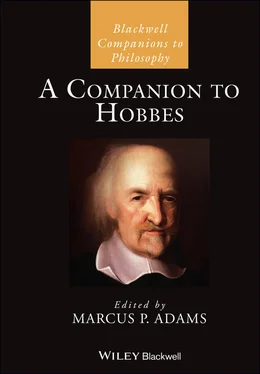1 ...6 7 8 10 11 12 ...48 The natural state of humans – the state of nature – is one of the most evocative parts of Hobbes’s philosophy. Against understanding the state of nature as diametrically opposed to the state of civil society, S.A. Lloyd’s chapter “The State of Nature as a Continuum Concept” argues that the state of nature differs from civil society in degrees. In other words, there are states of nature rather than a simple line that is crossed upon the formation of a commonwealth. Lloyd articulates this spectrum as ranging from a condition of mere nature, characterized by a universal right of private judgment, to a perfectly totalitarian state. This approach to Hobbes’s state of nature offers an understanding of humans’ natural state that can make sense of how imperfect political systems are more or less like the mere state of nature. Lloyd argues that the continuum view is more theoretically and empirically plausible than alternative views that claim that Hobbes saw civil society as always at risk of falling back, at any moment, into the mere state of nature.
Michael Green’s chapter “Hobbes’s Minimalist Moral Theory” challenges conceptions of Hobbes’s moral theory that have taken it to follow from broader aspects of Hobbes’s philosophy, such as an aim to harmonize morality with one’s self-interest, as a type of divine-command theory, or following from an account of rationality. In place these accounts, which Green identifies as maximalist theories, Green offers a minimal theory relying upon two theses drawn from Hobbes’s discussions of the Laws of Nature: the value thesis, which holds that the laws are valued because of their role in preserving peace, and the conditional thesis, which holds that what the laws require depends upon what others do. In contrast to more maximal moral theories, Green shows that with only this minimal theory Hobbes can accomplish his goals of arguing for the benefits of the state and constructing an alternative to Aristotle’s theory of justice.
The break between natural bodies and political bodies occurs with the creation of the commonwealth, but the ability to represent, e.g., one person representing another person, is something possible within humans’ natural state, and it is part of what enables commonwealth to be generated. Mónica Brito Vieira’s chapter “Hobbesian Persons and Representation” traces Hobbes understanding of “person” and its linkage with a capacity for agency. Persons can be natural (when someone’s words and actions are considered their own) or artificial (when someone’s words and actions are considered as representing those of someone or something else), and whoever owns the words spoken or actions done is considered the author. Hobbes furthermore differentiates between true representation, which is when the represented party authorizes its representation, and representation by fiction, which is when the represented party cannot authorize its representation, but the actions of the representative are nonetheless held (by fiction) to be its own (Hobbes 2012, 244; 1651, 80). However, Hobbes does not explicitly say what sort of person the state itself is, and there has been disagreement among scholars. Connecting Hobbes’s discussion of entities such as churches, hospitals, and bridges to the issue of the state, Vieira argues that the state is a person by fiction.
Rosamond Rhodes’s chapter “Hobbes’s Account of Authorizing a Sovereign” challenges a widely held interpretation of Hobbes’s understanding of how humans leave their natural state and authorize the sovereign: that the sovereign is a third-party beneficiary of a covenant between individuals. Against this view of Hobbesian authorization, Rhodes offers a nuanced understanding that relies upon distinguishing two steps: the establishment of the commonwealth and the subsequent authorization of the sovereign. In the time between these two steps, the commonwealth (formed in step 1) selects its form of sovereignty, whether it will be a monarchy, aristocracy, or democracy. The view of Hobbes’s sovereign that arises from Rhodes’s interpretation is of a sovereign who can be held accountable for their actions since they are party to the covenant.
Moving from focus on the sovereign to the subjects of the commonwealth, Eleanor Curran examines subjects’ rights in the chapter “The Strength and Significance of Subjects’ Rights in Leviathan .” Curran argues that subjects do not give up all their rights to a sovereign and that not all Hobbesian rights are simple Hohfeldian liberty rights, i.e., rights without correlative duties. On Curran’s account, the theory of rights found in Hobbes’s Leviathan is uniquely modern and secular, with no theological premises and no attachment to traditional notions of natural law.
Against the view that Hobbes’s account of sovereignty in Leviathan is one of an immortal, all-powerful artificial being, Tom Sorell argues in the chapter “Hobbes on Sovereignty and Its Strains” that the Hobbesian model of sovereignty, even when it is functioning as it ideally should, is fragile. While Sorell notes that, according to Hobbes, those who form a commonwealth do so with the aim of it continuing indefinitely, there many ways in which that continuity can be broken. Sorell suggests that Hobbes’s theory of the rights of sovereigns is crafted in such a way as to correspond to the list that Hobbes provides of the causes of the dissolution of commonwealths, but alongside the rights of sovereigns Hobbes outlines their duties. The recognition of the fragility inherent in this setup makes an ideal Hobbesian commonwealth a balance between the exercise of the rights of sovereigns and the durability of subjects’ transfer of the right of nature.
What, if anything, constrains Hobbesian sovereigns or their commonwealths from interacting with one another on the international scene has been a frequent topic of debate among interpreters of Hobbes. Johan Olsthoorn’s chapter “Hobbes on International Ethics” draws attention to a change in Hobbes’s works on this issue. Olsthoorn argues that a common view among Hobbes’s scholars – the claim that in the international state of nature commonwealths occupy a normative position analogous to individuals in the interpersonal one (what Olsthoorn calls the “assimilation argument”) – has textual support in De cive , but that a change Hobbes makes in the Leviathan suggests an alternative account. Drawing upon the Leviathan , Olsthoorn argues that the norms of international ethics are directly applied to sovereigns rather than to commonwealths. The resulting account portrays Hobbesian international ethics as informed by sovereign duties of care to national subjects.
Hobbes identifies language as a double-edged sword: linguistic ability is a prerequisite for science and other forms of cooperative activity, but used improperly it may lead users to hold beliefs that lead them astray. Language plays a central role in Hobbes’s criticisms of Scholastic metaphysics, and Hobbes’s alternative approach to language was meant to reform its usage. Luc Foisneau’s chapter “Against Philosophical Darkness: A Political Conception of Enlightenment” shows how this critique, in particular Hobbes’s assault on the notion of separated essences, concerns not only claims in metaphysics but also has a broader political end: to show that the language used by the Catholic Church promotes control of citizens’ minds. Tracing these criticisms through Hobbes’s account of schools in Greek and Jewish antiquity, Foisneau demonstrates that Hobbesian enlightenment is accomplished through state institutions and only by using vernacular language, not the language of Scholastic darkness. Such enlightenment for Hobbes is possible only within the state.
Читать дальше












